Apr
15
2009
[from Auburn Avenue blog]
The Christian imagination
Each semester at the Bucer Institute we have a course we call “The Church and Culture” which is basically a catch-all for any topic we’d like to talk about. Our “Church and Culture” class for this semester was held this past Saturday on the topic of “The Christian Imagination” and it was outstanding. (Check out the MP3s when they are ready for downloading, you won’t regret it.).
Too many good things were said to repeat them all, but here are a few of them:
- A woman living on the frontier in the 19th century commented on the quilts she made: “I make them warm to keep my family from freezing; I make them beautiful to keep my heart from breaking.”
- Poetry humbles us by giving us more than we can understand. It’s “bigger” than we are.
- Why are the Reformed so unimaginative? Artists tend to arise from traditions that allow mystery, not from traditions that see mystery as a threat to the “system” and therefore always seek to explain (or define) it away.
- The literal is too skeletal and minimalistic to carry the grand load of truth that the poetic can easily transport.
Some of the things covered were: the importance of the imagination; the imagination and theology; how to cultivate a sanctified imagination; a primer on poetry; and the deeper meaning of watching the dead bodies of plague victims being catapulted over the walls of a besieged city. All in all, it was more fun than ought to be legal.
Comments Off | tags: Auburn Avenue, Bucer Institute, Culture, Poetry | posted in Biblical Theology, Christian Life, Quotes
Apr
14
2009
The quiet, daily betrayals are just as capable of turning an ardent Christian into a confirmed, if uncomfortable pagan. C. S. Lewis believed that the ‘softly, softly’ approach is one of the key tactics of the Devil. To paraphrase Screwtape, he aims to introduce into every life that revolves around God a slight change in orbit that will ever-so-slowly send them spinning into outer darkness.
Read Mark Hadley’s review of the film, Good.
Comments Off | tags: C. S. Lewis, Film | posted in Christian Life, Ethics
Apr
14
2009
or The Resurrection of Christ: Get Over It.
 The resurrection of Christ is the linchpin upon which all of Christianity depends. It is the point of the spear when it comes to evangelism.
The resurrection of Christ is the linchpin upon which all of Christianity depends. It is the point of the spear when it comes to evangelism.
But when the best theologians spend much of their time philosophising about its basic implications, their thinking divorced from most of the Bible, and relying instead upon Jewish fables and other ancient writings to form their opinions, we have a problem. When the cream of the crop are gagging on the milk, we have a problem.
Continue reading
Comments Off | tags: Hermeneutics, James Jordan, Paul, Resurrection, Typology, Uri Brito | posted in Biblical Theology
Apr
13
2009
Peter Leithart’s excellent 2009 Easter homily is here.
Comments Off | tags: Peter Leithart, Resurrection, Totus Christus | posted in Biblical Theology, Christian Life
Apr
13
2009
And He said to me, “Son of man, stand on your feet, and I will speak to you.” Then the Spirit entered me when He spoke to me, and set me on my feet; and I heard Him who spoke to me. And He said to me: “Son of man, I am sending you to the children of Israel, to a rebellious nation that has rebelled against Me; they and their fathers have transgressed against Me to this very day. (Ezekiel 2:1-3)
I started Hebrew lessons this week. We’ll see how long I last! Anyhow, my teacher made a comment about Ezekiel 2:1. Apparently, the phrase translated “I will speak to you” is actually a gloss. Literally, it says, I will speak you. The Lord gives Ezekiel a scroll to eat and sends him as son of man against Jerusalem.
So, as son of man, Ezekiel is the living, walking WORD. He is the Law written on tablets of flesh.
Comments Off | tags: Exile, Ezekiel, Hebrew, Translation | posted in Biblical Theology
Apr
13
2009
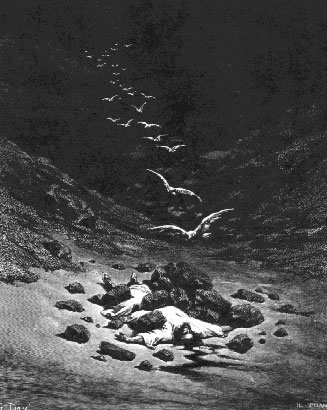
“And all Israel stoned [Achan and his family] with stones, and burned them with fire, after they had stoned them with stones.”
Questions from blogger Blue Ollie:
Many still claim to get their morals from the Bible. Well, what does the Bible actually say?
The following is a very incomplete list but is nevertheless a valid list.
1. How do you determine if someone is guilty? Answer: gamble.
Continue reading
1 comment | tags: Abraham, Achan, Atheism, Joshua, Justice, Lot, Sodom, Urim and Thummim | posted in Apologetics, Biblical Theology, Ethics
Apr
12
2009
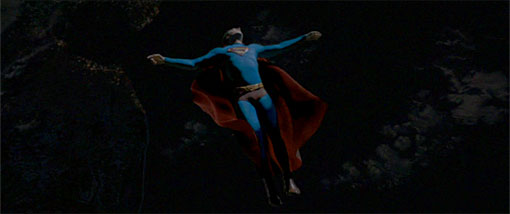
The movie Superman Returns ends with some powerful iconography. Lex Luther has used a crystal stolen from Superman to create his own ‘new earth.’ Unlike Superman’s white-as-snow fortress of solitude, this is made of dark stone, Adamic earth. It rises up out of the sea and its growth threatens mankind.
Superman carries the weight of the entire sinful rock, and its growing kryptonite ‘spears’ pierce him. He ‘dies’ in the air and his fall to earth creates a ‘tomb.’ It’s worth a watch.
My point is, the idea of Christ being ‘lifted up’ is more than the bronze serpent, more than us ‘lifting Him up’ in our witness. [1]
Lifted up between heaven and earth, He was an open scroll. The bloodied lid of the Ark, the Word engraved (opened) on tablets of flesh. [2] In the sky, He was a new kapporet [3], a firmament covering to replace the old one that was ready to vanish away. He was a veil that was open, still protecting yet providing full access.
The Old Testament is full of mediators who are ‘lifted up.’ Revelation shows the Satanic new earth (Herod and Rome) thrown down from her mediatory position ‘in the air’, and the saints ascending to meet their Lord ‘in the air’ as a new mediatorial city.
a) Christ was lifted up.
b) Satan was thrown down.
a1) The saints of the New Jerusalem ascended.
b1) The compromised mediators were thrown down.
Satan is no longer the prince of the powers of the air.
__________________
[1] A Herod also fulfilled the bronze serpent image, eaten alive by maggots on his throne ‘in the air’ after speaking ‘like a god.’ He prefigured the dirty scavenging birds feasting on the harlot in Revelation.
[2] The Tabernacle layout is a symbolic cruciform man. Notice that Christ on the cross was beneath ‘the Name’, an open scroll containing the disputed truth of His identity. The Lord’s Name was said to dwell above the lid of the Ark.
[3] See Peter Leithart, The Footstool of His Feet.
Comments Off | tags: Add new tag, Ark of the Covenant, Covenant curse, Crucifixion, Film, Herod, Peter Leithart, Preterism, Tabernacle, Typology | posted in Biblical Theology, The Last Days
Apr
11
2009
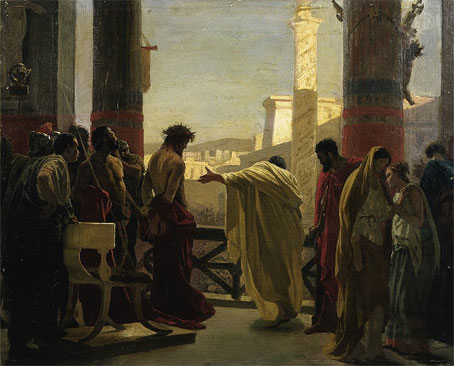
The Jews choose a violent, thieving murderer—like Herod—a beast, for release instead of the Son of God. When forced to choose, they publicly proclaim Caesar (Daniel’s fourth beast) as their king. When Adam is unjust, Eve follows the “light” of a beast.
Like Joseph and Daniel, the obedience of the suffering servant brings a nightmare to the Gentile ruler, or in this case, his wife. She warns Pilate to have nothing to do with “that just man”. From the seat of judgment, he gives the Jews a choice. Like Joseph and Daniel, the Jews unwittingly open the mystery of God.
Jesus is crowned with thorns as Adam’s successor. As Israel, He is a cursed Land bearing a cursed crop—the crown of Abimelech, the bramble king who slays his brothers. Christ dies on behalf of Herod’s kingdom, a compromised rule whose only use was kindling in God’s nostrils.
As High Priest making atonement on the mountain of God, Jesus is again flanked by two men. One ascends to paradise. The other goes to destruction.
Comments Off | tags: Abimelech, Atonement, Crucifixion, Daniel, Joseph, Judges, Pilate, Typology | posted in Biblical Theology
Apr
11
2009
Samson is often presented as a moose.
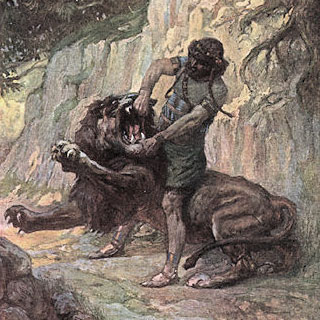 A commonly held opinion is that Samson was stupid. However, his earlier acts were inspired by the influence of the Spirit, carefully calculated, spectacularly executed and achieved the desired results.
A commonly held opinion is that Samson was stupid. However, his earlier acts were inspired by the influence of the Spirit, carefully calculated, spectacularly executed and achieved the desired results.
For instance, Samson only told his wife the answer to his riddle so he would know where the leak came from when she was tested.
This reminded me of the test for harlotry in Numbers 5. The priest administers the bitter word to the woman, and if she passes the test, she will be a fruitful blessing.
Samson’s wife failed the test, and the outcome was a bit like that after the harlotry with the golden calf, with Samson as the slaughtering Levite.
Speaking of which, Numbers 5 comes right before Numbers 6 — the Nazirite vow. Men who took this vow became, basically, warrior brides. Their uncut hair was a sign of submission. Revelation draws on this imagery to describe the apostles and first century saints as virgins.
So Samson’s wife betrayed him, and Samson betrayed his own covenant ‘husband,’ the Lord.
Doug Wilson points out (somewhere) that biblical relationships are more complex than those of Islam. In Islam, the line of authority is linear, the natural outcome of a simple god of power. Might is right, from top to bottom. With Christianity, the submission of the members of the Trinity within the Godhead overflows into family and society, with the members submitting to one another, and constantly bestowing good upon one another.
So Samson can be both a bride and a bridegroom. Facing heaven, a minister is part of the bride. Facing his church, he images the bridegroom.
Comments Off | tags: Doug Wilson, Judges, Numbers 5, Samson, Trinity | posted in Biblical Theology
Apr
11
2009
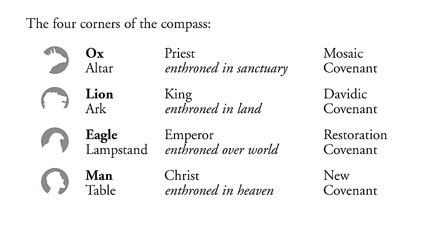
It was always God’s plan that Israel have a human king:
“When you come to the land which the LORD your God is giving you, and possess it and dwell in it, and say, ‘I will set a king over me like all the nations that are around me,’ you shall surely set a king over you whom the LORD your God chooses; one from among your brethren you shall set as king over you; you may not set a foreigner over you, who is not your brother.” Deut. 17:14-15
Like Adam, this dominion would only come by obedience: by servanthood to God and faithful mediatory witness to the Gentiles. But like Adam, they seized dominion and demanded “a king like the Gentiles.” With Saul, they had a king who palled around with Agag of Amalek whom Moses commanded to wipe from the face of the earth.
Continue reading
Comments Off | tags: Abimelech, Amalek, Babylon, Covenant Theology, Daniel, Exile, James Jordan, Malachi, Mordecai, Temple, Zechariah | posted in Biblical Theology, The Restoration Era































